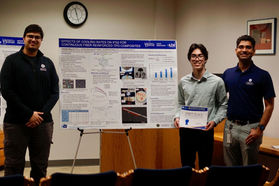

Artificially Intelligent Manufacturing Paradigm for Composites
Energy Frontier Research Center (EFRC)
Mission
The mission of this EFRC is to build an AI-enabled inverse design approach for fundamental understanding and integrated material-manufacturing design of advanced polymer composites.
While uncovering these fundamental insights, this EFRC also aims to build Inverse Design Software (InDeS) tools that accelerate the discovery of advanced polymer composites for improved performance and energy-efficient manufacturing, thereby enabling a smaller carbon footprint, lower structural weight, and lower cost.
Announcements
.png)
Register for our next webinar on Febuary 16th,2026
Our next webinar, " AGAPI: AtomGPT.org API for Agentic AI in Materials Discovery and Design" presented by Dr. Kamal Choudhary from Johns Hopskins University is scheduled for Febuary 16th. Click Here to Register
Center News and Press
Center Highlights
Research Goals
-
Unravel the fundamental underpinnings of the material-process-microstructure-performance (MP2) relationship via constructing an “Digital Life Cycle” (DLC) that represents a suite of seamlessly linked, experimentally converged, high-fidelity models embracing all stages of a composite component’s life cycle, linking perceived risk from energy consumption to carbon footprint
-
Leverage physics-informed AI models and build microservice-based cloud tools to enable inverse composites material architecture and manufacturing process design
-
Inform and validate the DLC and AI models and implement new material and process designs by exploiting innovative material engineering, characterization, and testing methods
Research Thrusts

Research Thrust I is the DLC representing a suite of seamlessly linked, high-fidelity multiscale models for simulating all stages of a polymer composite’s life cycle, which also integrates uncertainty and environmental-energy-economic (E3) impact quantification. The DLC will enable the generation of a large quantity of high-fidelity data for the development and training of AI models in Research Thrust II.
Equipped with the DLC generated data, in Research Thrust II AI modeling and inverse design research thrust, we are developing new AI models to efficiently map the composite materials’ architecture and the manufacturing process to composite components’ performance. Next, we are developing generative neural networks for material and manufacturing process inverse design.
In Research Thrust III we are conducting material characterization and testing of mechanical, physical, rheological, and morphological properties at nano-, micro-, and macroscales to inform and validate both DLC and AI models and simulations.
We will also implement new/hybrid processes that combine existing or new scalable processing routes to create tailored composite micro and macro structures. Finally, the inverse design is performed by the generative AI models and validated by experimental tests.










